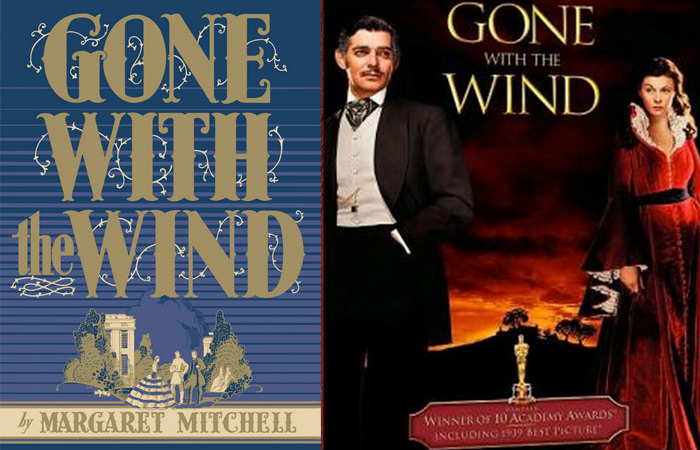16 Book-to-Movie Adaptations the Awards Shows Loved
The Oscars are all about the movies, but it’s usually a good night for book lovers too. This year, for example, four of the nine nominees for Best Picture are adaptations of books—The Wolf of Wall Street, 12 Years a Slave, Captain Phillips (A Captain’s Duty), and Philomena (The Lost Child of Philomena Lee). Of course, it goes without saying that great books (or sometimes not so great ones) often make for the best movies. Here are 16 films that made Oscar magic on their trip from page to screen:
Gone with the Wind (1939)
Margaret Mitchell’s novel was one of the most popular books of its era. In 1939, it became the biggest movie ever, earning more than $1.6 billion at the box office in today’s dollars (adjusting for inflation, it’s still number one on the U.S. box office charts, even 75 years later). Oscar showed it some love, too—it took home 10 Oscar statues.
Rebecca (1940)
The adaptation of Daphne du Maurier’s haunting psychological novel was a big hit for director Alfred Hitchcock. Though it’s one of his lesser-known pictures today (eclipsed by flashier fare like Psycho and The Birds), it’s the only one of his films to be named Best Picture by the Academy.
To Kill a Mockingbird (1962)
Harper Lee’s only novel was enough to win her the Pulitzer Prize, so it’s no surprise that the film version was an Academy favorite. Though it lost out on Best Picture to Lawrence of Arabia, Gregory Peck’s iconic turn as Atticus Finch earned its place in the history books (and our hearts).
Mary Poppins (1964)
There’s a whole movie (Saving Mr. Banks) about P.L. Travers’ dislike of the Disney adaptation of her book, but that doesn’t change the fact that the film (nominated for a near-record 13 Oscars) is a stone-cold classic.
The Graduate (1967)
Here’s an instance where the film version has come to replace the book in the popular consciousness. Many probably aren’t even aware that the story of Benjamin Braddock and Mrs. Robinson was written as a novel first, but the movie has some of cinema’s most famous scenes. (“Plastics!” loses out narrowly to “Mrs. Robinson, I think you’re trying to seduce me.”) It only walked away with one statue on Oscar night (for Best Director), but that did little to affect its legacy.
Love Story (1970)
Erich Segal’s improbably successful novel, which had a first printing in paperback of over 4 million copies, became the biggest film of the year. Despite some…questionable dialogue (“Love means never having to say you’re sorry” will do you no favors in an argument with your spouse, trust me), it also earned seven Oscar nominations.
The Godfather (1972)
What’s left to say about this one? Regularly topping the list of the best films ever made, Francis Ford Coppola’s film redefined the mob onscreen, became an unlikely box office hit, and collected a Best Picture Oscar—and, most would agree, vastly improved upon Mario Puzo’s pulpy source material.
One Flew Over the Cuckoo’s Nest (1975)
It took producers over 10 years to figure out how to turn Ken Kesey’s novel into a movie, but apparently they did something right. The adaptation was only the second film to earn all five major Academy Awards, including one for Jack Nicholson’s career-defining role as mental patient Randle McMurphy.
All the President’s Men (1976)
Though it lost out on the top award to Rocky (admittedly a much more fun hero to root for), the story of the efforts of reporters Bob Woodward and Carl Bernstein (who wrote the book) to uncover the truth about a political scandal that would ultimately take down a president makes for riveting viewing to this day.
Ordinary People (1980)
Plenty of film fans are still pissed that Robert Redford’s adaptation of Judith Guest’s novel beat out Raging Bull for Best Picture. I think they were just embarrassed that the movie reduced them to puddles of tears (or maybe that was just me).
Terms of Endearment (1983)
Larry McMurtry would win his own Oscar for adapting Brokeback Mountain into a screenplay in 2005, but 20 years earlier it was his own novel that served as the inspiration for this winner of the “big five” Oscars (Best Picture, Best Director, Best Screenplay, and Best Actor and Actress).
The Silence of the Lambs (1991)
Jonathan Demme took Thomas Harris’s slick serial killer thriller and made it into art (with big assists from Jodie Foster and Anthony Hopkins). The only horror film to ever win big at the Oscars, it spawned an entire franchise of movies and TV shows based on the adventures of Hannibal the Cannibal.
Schindler’s List (1993)
Working from the historical account in Thomas Keneally’s Schindler’s Ark, Steven Spielberg created one of the most harrowing, important films ever made. Oscar agreed, giving it seven statues, including Best Picture.
Forrest Gump (1995)
Though it bears little resemblance to its source material, Winston Groom’s novel still gets credit for creating the spark that brought Gump to life (and at least part of the blame for more bad Tom Hanks impressions than anyone could have predicted).
The English Patient (1996)
For some reason, Anthony Minghella’s Best Picture winner is regarded as a bit of a joke these days (I blame Elaine from Seinfeld), but I still think it’s about as successful a streamlining of Michael Ondaatje’s glorious novel (one of my all-time favorites) as we were ever likely to see.
The Lord of the Rings: The Return of the King (2003)
Though my favorite of Peter Jackson’s first epic trilogy (the less said about The Hobbit, the better) is actually The Fellowship of the Ring, Oscar showed the most love for the final chapter, awarding it with 11 Oscar nominations—and 11 wins.
